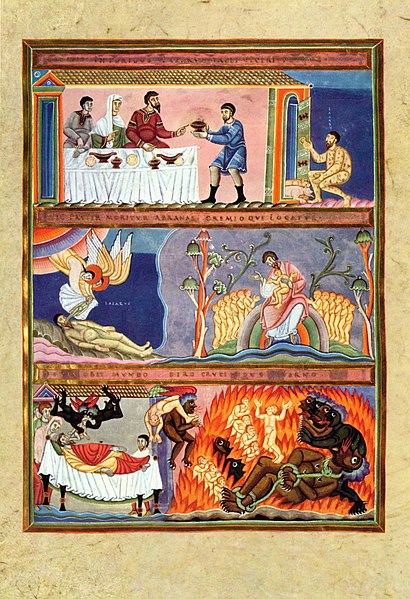Luke 16 is the sixteenth chapter of the Gospel of Luke in the New Testament of the Christian Bible. It records the teachings and parables of Jesus Christ, including the account of the "rich man and Lazarus". There is an "overriding concern with riches" in this chapter, although other topics are also covered. The book containing this chapter is anonymous, but early Christian tradition uniformly affirmed that Luke the Evangelist composed this Gospel as well as the Acts of the Apostles.
The Latin text of Luke 14:30–19:7 in Codex Gigas (13th century).
Lazarus and Dives, illumination from the Codex Aureus of Echternach Top panel: Lazarus at the rich man's door Middle panel: Lazarus' soul is carried to Paradise by two angels; Lazarus in Abraham's bosom Bottom panel: Dives' soul is carried off by two devils to Hell; Dives is tortured in Hades
The rich man and Lazarus is a parable of Jesus from the 16th chapter of the Gospel of Luke. Speaking to his disciples and some Pharisees, Jesus tells of an unnamed rich man and a beggar named Lazarus. When both die, the rich man goes to Hades and implores Abraham to send Lazarus from his bosom to warn the rich man's family from sharing his fate. Abraham replies, "If they do not listen to Moses and the Prophets, they will not be convinced even if someone rises from the dead."
Lazarus and Dives, illumination from the 11th-century Codex Aureus of Echternach Top panel: Lazarus at the rich man's door Middle panel: Lazarus' soul is carried to Paradise by two angels; Lazarus in Abraham's bosom Bottom panel: The rich man's soul is carried off by Satan to Hell; the rich man is tortured in Hades
Detail from the prefatory cycle to the Eadwine Psalter, Morgan Library leaf M.521 (recto), English c. 1160s
Illustration by Gustave Doré of the Rich man and Lazarus.
Illustration of Lazarus at the rich man's gate by Fyodor Bronnikov, 1886.





